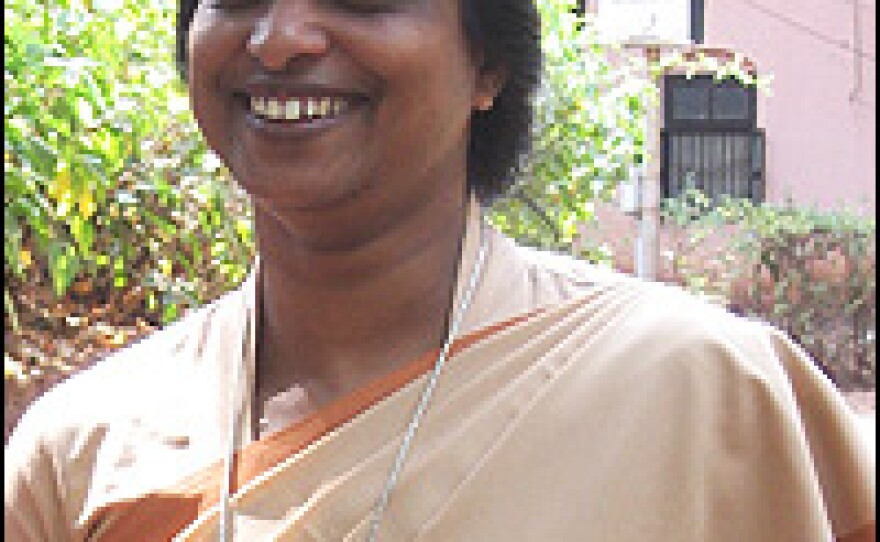
Bel-Air Hospital near the resort town of Panchgani in India's Western Ghat mountains was originally built to care for people with tuberculosis.
The clear air and hygienic surroundings of Bel-Air, founded in 1912 by Dr. Rustom Billimoria, were promoted as therapeutic and restorative. The hospital's lush campus, spread out over 44 acres, grew to 50 buildings over the next few decades.
Today, 95 years later, the bucolic setting of Bel-Air is still seen as healing — this time for patients with HIV, many of whom also have TB.
And the hospital now is able to offer more than air. There are free drugs for TB and the infections related to AIDS, which help keep patients alive long after they leave.
Some of the patients also qualify for drugs that fight HIV. There aren't enough drugs for everyone, but about 25 percent of the people who need medication get it. This percentage is expected to rise as a new government program takes effect this summer, said Father Tomy Karyilakulam, the hospital's director.
Struggle to Survive
Like many of the patients here, Bel-Air has cheated death. In the 1980s, it fell into near ruin as the hospital's owner, the Indian Red Cross Society, curtailed services after cutbacks in government funding for the hospital.
Also, new TB drugs were eliminating the need for a hospital stay, though improper use of the drugs worldwide would later become a major problem.
When Karyilakulam, a Catholic priest from the Missionary Congregation of the Blessed Sacrament, happened upon Bel-Air while on vacation, there were just 25 TB patients left, living in two buildings. There were no doctors or nurses in sight.
Karyilakulam found that some of the buildings had been turned over to people in Mumbai and were being used as a resort. He saw this as unacceptable in a country with so many unmet health care needs.
"I knew that India needed a lot more health care centers and that a dying health care facility can be revived to help people," he said in a recent interview.
AIDS a Surprise
He worked with the Red Cross to stop the land grab. One of the Red Cross trustees, Homai N. Modi, stepped in to help. She went on to aid Karyilakulam in raising tens of millions of rupees, amounting to well over a million dollars. With this, Karyilakulam and his congregation began repairing Bel-Air's buildings.
The plan was to build a general hospital to serve the surrounding area — a rural impoverished region in the southern part of Maharashtra state south of Mumbai.
"HIV was an absolute accident," Karyilakulam said. "I never imagined it would be so big."
Last year, more than 1,000 patients with HIV were treated at Bel-Air.
Community Opposed
When the hospital started treating people with AIDS, word got around quickly.
The reaction in neighboring Panchgani was severe. Local residents feared that having a large number of people with HIV so close would depress the resort's attractiveness.
Local attitudes were so adverse that an armed mob charged the hospital one night and threatened to kill Karyilakulam. He was put in protective custody in the town's jail.
"Instead of walking out, which most people would've done, he stuck on," Modi told a Mumbai filmmaker last year. "It was a place that was really sinking at that time."
Rejection High
What stirred Karyilakulam into action against AIDS was the discrimination and stigma he saw all around him, he said. Doctors from around the region were sending extremely sick patients with AIDS to him. They would tell stories of how they were not given treatments — or the wrong treatments. Surgeons refused to operate on them. Nurses would not touch them.
It even happened at the newly revived Bel-Air.
As Karyilakulam tells it, an HIV-positive man who was in a bad motorcycle accident, with several major fractures, came to Bel-Air for critical surgery after three other facilities rejected him. But he didn't find immediate acceptance at Bel-Air.
"When I saw my doctors rejecting ... I was mad," Karyilakulam said. "I just felt that we cannot not help, and we needed to do something about it. So, I jumped into the fray."
He persuaded the surgeon to operate, but it took considerable time to locate an anesthetist. And he found that his own nurses, who had willingly treated people with AIDS before, were reluctant.
"I said how can we allow this? Can we allow this man to die in this situation without care?" Karyilakulam said. "I won't force you to do it," he said he told the nurses and sent them off for the night. "When they returned the next morning, they said they'd do it, and they did it."
Now Stigma-Free
Today, Bel-Air performs three to four operations a day on people with AIDS and "nobody's afraid," Karyilakulam said. "Absolutely any patient comes in and we do it."
At Bel-Air, the emphasis is on removing the fears that many people have about AIDS and treatment. Though discrimination levels in India are lower than in the past, many people report being ostracized by their communities and rejected by medical facilities.
Bel-Air requires that patients arrive with at least one family member or a friend. The aim is to help teach this person what's needed to care for someone with AIDS – but it's also designed to spread a non-discrimination message back to the community.
Health workers also spend considerable time counseling patients.
"When they go back home, they don't know how they're going to be received by their near and dear ones or their neighbors," said Sister Dr. Anita, a Franciscan nun who has received training in the United States.
Treatment of HIV has eased some of the stigma and fear of the diagnosis, but psychological reactions can still be extreme and require treatment.
"Once sick, you can become depressed," Sister Dr. Anita said. "And that depression can kill you."
A major change that she's seen recently is that patients are getting well and returning months or years later for a second visit.
"We are making a difference," she said.
Training Grounds
The renovation of Bel-Air is nearly finished. The old Colonial-era buildings are freshly painted. Windows are no longer broken. The wards are clean and tidy.
Karyilakulam has set out to expand Bel-Air's reach. He's building a two-story nursing school at the edge of a cliff — with one of the best views of the green valley below. The four-year baccalaureate program graduates 40 nurses a year.
Many nearby hospitals and facilities have agreed to help with the training and to send their nurses and doctors for education in how to treat HIV and AIDS. And the University of Illinois-Chicago is helping structure the curriculum.
Joe Neel is a Kaiser Family Foundation Media Fellow this year.
Copyright 2022 NPR. To see more, visit https://www.npr.org. 9(MDAzMjM2NDYzMDEyMzc1Njk5NjAxNzY3OQ001))






